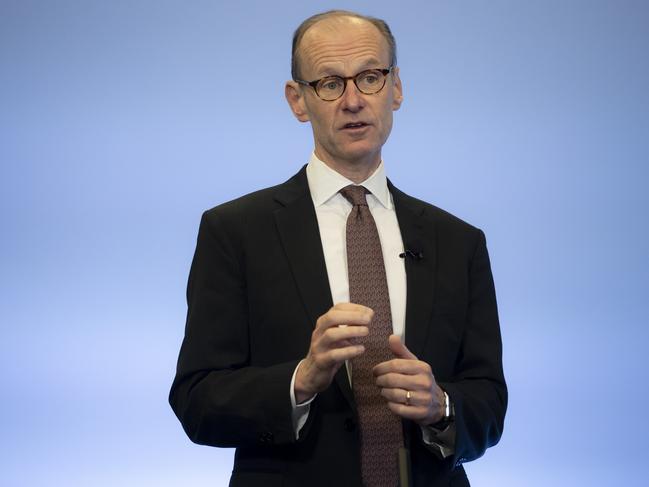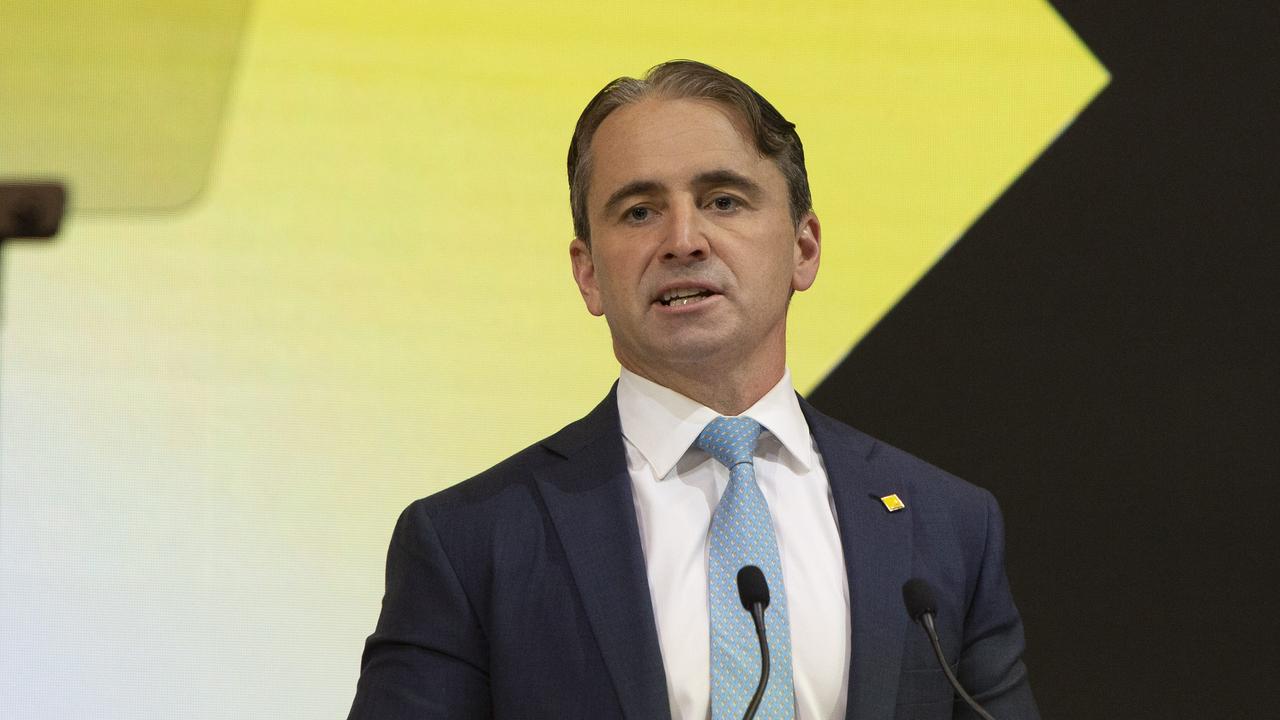Major bank tussle against mortgage brokers intensifies with commissions in focus
The profitability of mortgages for the major banks is severely challenged, giving rise to a fierce new battleground. Are broker commissions in the firing line?

Business
Don't miss out on the headlines from Business. Followed categories will be added to My News.
The profitability of mortgages for the major banks is under pressure, giving rise to what promises to be a fierce new battleground.
Mortgage brokers – which facilitate about 74 per cent of all new home loans written in Australia – are increasingly in the firing line. It’s an issue the big four banks are assessing closely, with at least two focusing more heavily on writing loans through their own proprietary channels.
The bigger question, though, is whether the major banks will start to rein in commissions they pay mortgage brokers as well as increasingly trying to entice customers back to direct bank channels. Think digital loans, mobile lenders and bank branches.
Two big bank chief executives canvassed by this column made it clear that with shrinking net interest margins – what banks earn on loans less funding and other costs – brokers may at some point be forced to share the pain. One way of that happening is banks cutting the commissions they pay when brokers introduce home loans to them.
Banks typically pay mortgage brokers a 0.65 per cent commission on the drawn home loan amount, and trail commission of 0.15 per cent annually. Analysis by KPMG of the major banks’ annual profit results shows the average net interest margin decreased by seven basis points to 180bps. KPMG found the return on average equity across the four big banks fell by 80bps to an average of 10.9 per cent.

“People like brokers. We’re not trying to kill them. We’re not trying to go out and get rid of them,” says Shayne Elliott, ANZ’s CEO. “There’s a role they play. They are a valuable source of business.
“Are they getting more than their fair share of the profit pool? … I would argue that given the reduction in profitability of home loans over a long time, they haven’t really shared in that pain. The banks have taken all the pain on that … I don’t know how that (sharing of pain) comes to fruition, but … it’s a big strategic challenge for the industry.”
National Australia Bank CEO Andrew Irvine used the lender’s full-year results to highlight a more concerted push to write home loans through its own channels. He said it was possible that banks could lower broker commission rates, but it was a difficult proposition.
“We’ll have to see. Obviously, it’s a competitive market, and if you pay less (commission) for your home loans, and other people (banks) pay more, I wonder what will happen in terms of broker intent. They still have the best interest duty to their customers, so that gets tricky. I don’t know how that would play out.
“Broker commissions are the same as they were four or five years ago, but bank margins aren’t. And so at some point … does that force a change? We’ll see.”
Irvine has a point. In 2008, Westpac broke ranks with its peers and announced a 20bps cut from its then 0.7 per cent upfront commission to mortgage brokers, and 10bps from its 0.25 per cent trailing commission. At the time it was cutting commissions from levels that were relatively standard across the market for prime mortgages.
Broking groups, who were then not covered by regulations to act in the borrower’s best interest, punished the bank through lesser home loan flows and Westpac eventually retreated. The move did lead to upfront and trail commissions reducing slightly across the board, to around prevailing levels, but nowhere near what Westpac had hoped.
As a result of the Hayne royal commission, and concessions by the then Morrison government, brokers retained the commission structure but are now bound by requirements to act in the best interest of the customer/borrower. That means if a bank is offering the best rate or terms to a potential borrower but a lower commission to the broker, they must recommend that bank.
Commonwealth Bank – the nation’s largest mortgage lender – has been pushing its own channels, direct and digital mortgages for some time. CEO Matt Comyn has, at times, raised the ire of the broking community, including during the Hayne royal commission, when he suggested brokers were not typically adding value for a customer to earn the annual trail commission.

Brokers would argue that they periodically help customers ensure they are getting a better interest rate and the right conditions, rather than trusting what their bank offers on face value.
CBA’s latest fiscal year results show its proprietary channels accounted for 65 per cent of the bank’s home loan mix for new mortgage business, excluding Bankwest and its NZ division. Across the Australian operations the figure is about 54 per cent, meaning brokers account for 46 per cent.
The figures at CBA’s three major rivals show a greater reliance on brokers.
Some 65 per cent of ANZ’s home lending flows – excluding the newly acquired Suncorp Bank’s mortgages – came via brokers in the 12 months ended September 30, up from 64 per cent the prior year.
Some 61 per cent of NAB’s mortgage flows in the six months ended September 30 came from brokers, down from almost 65 per cent in the prior half. Over at Westpac, some 63.6 per cent of mortgage flows in the same period emanated from brokers.
With the commoditisation of some banking products, including home loans, over the past decade, many players are trying to rekindle the emotional connection with their customers.
Citigroup’s former CEO Mike Corbat made a valid point during his tenure, saying the bank was “very conscious around not being the dumb utility”. He said Citigroup didn’t want to unconsciously give away ownership of the customer.
In Australia, a cosiness among the big banks and the failure to reward loyalty has led borrowers to brokers in droves. In some respects, the problem banks now face is of their own making.
An argument getting louder since the Hayne royal commission and the big banks embarking on a collective divestment frenzy is whether large regulated banks are behaving more like utilities. That is linked to whether their return profiles will wither or can be sustained or revived.
As a result of more stringent regulation and lower risk appetite, the risk profile of the major banks has also markedly changed. Private credit and non-bank lenders have picked up some of the riskier borrowers.
Intense competition for home loan customers is among key reasons the retail banking divisions of all four big banks posted lower earnings for their last full years.
It’s a conundrum, and the pressure on major banks’ bottom lines does set up a real tussle with mortgage brokers in future.
ANZ retail boss Maile Carnegie told analysts on Friday it wasn’t necessarily commissions that were weighing on the profitability of broker-originated loans.
“The key drivers of that profitability difference are a combination of how long a broker customer is on your book and how engaged that customer is in your products beyond just a home loan,” she said, noting ANZ was looking at ways to retain broker-introduced customers for longer and partner better with brokers.
Elliott’s new lower-cost banking platform Plus is part of ANZ’s solution. It is also seeking to use it to engage better with customers, which would lower churn.
Interestingly, though, NAB earlier this year joined some of its rivals to loosen clawback provisions for mortgage brokers. These allow banks to ask for a portion of broker commissions to be repaid to the lender if the mortgage is paid out quickly or not retained for a certain period.
MST Marquee analyst Brian Johnson asked Elliott about the potential for differential interest rate pricing for loans coming to ANZ via brokers.
Elliott said he and Carnegie had recently had that conversation: “We are not there yet … but philosophically of course we should and of course we should have channel differences.”
As pressure on bank profits persists, brokers should be alert to changes.
More Coverage
Originally published as Major bank tussle against mortgage brokers intensifies with commissions in focus





